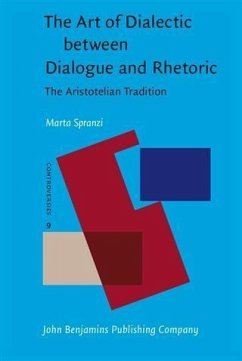This book reconstructs the tradition of dialectic from Aristotle's Topics, its founding text, up to its "e;renaissance"e; in 16th century Italy, and focuses on the role of dialectic in the production of knowledge. Aristotle defines dialectic as a structured exchange of questions and answers and thus links it to dialogue and disputation, while Cicero develops a mildly skeptical version of dialectic, identifies it with reasoning in utramque partem and connects it closely to rhetoric. These two interpretations constitute the backbone of the living tradition of dialectic and are variously developed in the Renaissance against the Medieval background. The book scrutinizes three separate contexts in which these developments occur: Rudolph Agricola's attempt to develop a new dialectic in close connection with rhetoric, Agostino Nifo's thoroughly Aristotelian approach and its use of the newly translated commentaries of Alexander of Aphrodisias and Averroes, and Carlo Sigonio's literary theory of the dialogue form, which is centered around Aristotle's Topics. Today, Aristotelian dialectic enjoys a new life within argumentation theory: the final chapter of the book briefly revisits these contemporary developments and draws some general epistemological conclusions linking the tradition of dialectic to a fallibilist view of knowledge.
Dieser Download kann aus rechtlichen Gründen nur mit Rechnungsadresse in A, B, BG, CY, CZ, D, DK, EW, E, FIN, F, GR, HR, H, IRL, I, LT, L, LR, M, NL, PL, P, R, S, SLO, SK ausgeliefert werden.


